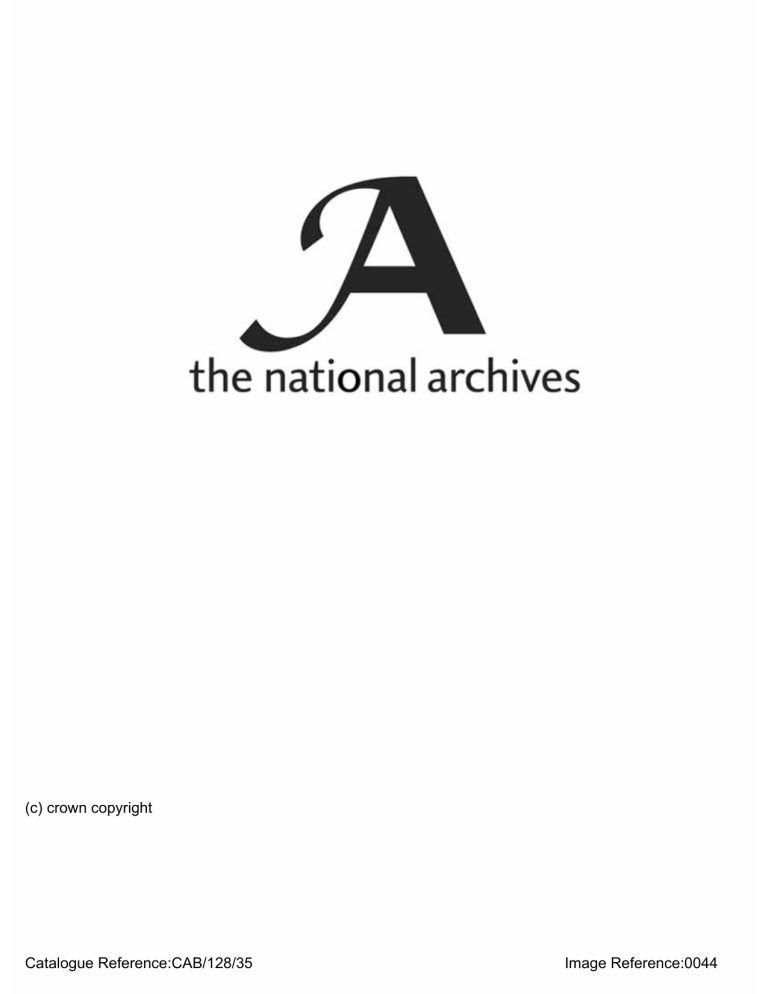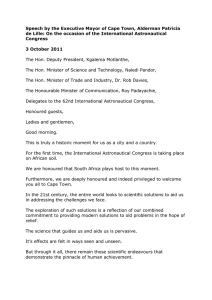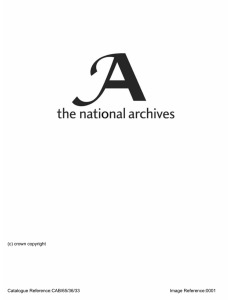(c) crown copyright Catalogue Reference:CAB/128/35 Image Reference:0044

(c) crown copyright
Catalogue Reference:CAB/128/35 Image Reference:0044
THIS DOCUMENT IS T H E PROPERTY O F H E R BRITANNIC MAJESTYS GOVERNMENT
Printed for the Cabinet. July 1961
C.C. (61) Copy. No.
44th Conclusions
C A B I N E T
CONCLUSIONS of a Meeting of the Cabinet held at Admiralty House, S.W.1, on Thursday, 27th July, 1961, at 11 a.m.
Present:
The Right Hon. R. A. BUTLER, M.P., Secretary of State for the Home Department
(in the Chair)
The Right Hon.
VISCOUNT KILMUIR.
j
T h e Right Hon.
SELWYN LLOYD, Q.C.,
Lord Chancellor j M.P., Chancellor of the Exchequer
The Right Hon. T h e E A R L OF H O M E , I The Right Hon.
VISCOUNT HAILSHAM.
Secretary of State for Foreign Affairs I Q.C., Lord President of the Council
The Right Hon.
J O H N MACLAY.
M . P . , and Minister for Science (Hem I) -
j
T h e Right Hon.
DUNCAN SANDYS, M.P.,
Secretary of State for Scotland ' Secretary of State for Commonwealth i Relations
The Right Hon.
IAIN MACLEOD, M . P . , ; The Right Hon.
HAROLD WATKINSON,
Secretary of State for the Colonies M . P . , Minister of Defence
The Right Hon.
H E N R Y BROOKE, M . P . , ' The Right Hon. Sir DAVID ECCLES,
Minister of Housing and Local i M . P . , Minister of Education
Government and Minister for Welsh 1
Affairs
The Right Hon.
PETER THORNEYCROFT. The Right Hon.
LORD M I L L S , Paymaster-
M . P . , Minister of Aviation General
The Right Hon.
REGINALD MAUDLING. The Right Hon.
JOHN HARE.
M.P.,
M . P . , President of the Board of Trade Minister of Labour
The Right Hon.
E D W A R D HEATH, M.P., Dr. The Right Hon.
CHARLES HILL.
Lord Privy Seal M.P., Chancellor of the Duchy of
Lancaster
The Right Hon.
E R N E S T M A R P L E S , M.P., The Right Hon.
CHRISTOPHER SOAMES,
Minister of Transport M.P., Minister of Agriculture, i Fisheries and Food
Also present:
The Right Hon.
MARTIN REDMAYNE.
M.P., Parliamentary Secretary,
Treasury
Secretariat :
The Right Hon. Sir NORMAN BROOK
Mr. F . A . BISHOP
Mr. M . R E E D
CONTENTS
Minute
No.
1 Europe
2
3
Parliament
Education
Teachers' Salaries
Subject Page
3
4
4
4 Civil Aviation
Airport Policy
5
5 Kenya ...
5
Jomo Kenyatta
CC. (44) 61
Europe
(Previous
Reference:
C C . (61) 42nd
Conclusions)
1. T h e Cabinet resumed their consideration of relations between the United Kingdom and the European Economic Community
(E.E.C.).
They confirmed the view, with which there had been general agreement at their previous discussion, that a formal application for accession to the Treaty of R o m e should be made without delay in order that negotiations might be opened with the Community with a view to ascertaining whether satisfactory arrangements could be made to meet our requirements, particularly in respect of British agriculture and of the needs of the other Commonwealth countries and the other members of the European Free Trade Association
(E.F.T.A.).
They then considered the draft of a statement to this effect, which would be made by the Prime Minister in the House of Commons on 31st July, together with the draft of a Government motion which would be the subject of debate in the House of Commons on 2nd and
3rd August.
Discussion first centred on the terms in which it should be explained that a formal application to join the Treaty of Rome was necessary as a means of entering into negotiations with the E.E.C.
There was general agreement that this might best be put in the following terms:
" We have reached the stage where we cannot make further progress without entering into formal negotiations. I believe that the great majority in the House and in the country will feel that they cannot fairly judge whether it is possible for the United
Kingdom to join the European Economic Community until there is a clearer picture before them of the arrangements designed to meet our special needs. Only negotiations can reveal this. In order to enter into negotiations it is necessary under the Treaty of Rome to make formal application to join the European
Economic Community, although the ultimate decision whether to join or not must depend on the result of the negotiations ".
It was suggested that it should also be brought out that Article 237 of the Treaty of Rome envisaged that the conditions of admission for a new member should be the subject of an agreement between the members and the applicant State. It was suggested that, after this explanation, the Governmenfs decision might be announced in the following terms:
" Her Majesty's Government have come to the conclusion that it would be right for Britain to make such an application to join the European Economic Community preparatory to entering into negotiations with a view to securing satisfactory arrangements to meet the special needs of the United Kingdom, of the Commonwealth and of the European Free Trade
Association ".
Alternatively the decision might be expressed as follows:
" Her Majcsty's Government have come t o the conclusion that it would be right for Britain to make such an application under Article 237 of the Treaty of Rome for negotiations with a view to joining the European Economic Community if satisfactory arrangements can be made to meet the special needs of the United Kingdom, of the Commonwealth and of the European Free Trade Association
There was general agreement that the Prime Minister should be asked to consider which of these forms of words would be preferable. The terms of the Government motion would have to be consistent with whichever of these alternatives was chosen.
The Cabinet were informed that a motion had been tabled on the previous day. and had now been signed by more than 30
Government supporters, expressing opposition to any material
derogation of British sovereignty, resulting from the entry of the
United Kingdom into the E.E.C., and urging that an agreement with the E.E.C. should not endanger the future expansion of trade with the Commonwealth and E.F.T.A., or the prosperity of British agriculture. It was pointed out that the act of joining the E.E.C. would inevitably entail some derogation of sovereignty and that, while this might -not be harmful, it might well be represented as material.
Nevertheless, the statement to be made by the Prime Minister would make it clear that the Government would not conclude any agreement to enter the E.E.C. without reeking the prior approval of Parliament, and there was accordingly no reason why the signatories of this motion should not also support the proposed Government motion.
At the same time, it would be helpful if the Government motion could include a specific undertaking to consult Parliament about any agreement which affected the special interests of the United Kingdom, in particular agriculture, and of the Commonwealth and E.F.T.A., or involved British sovereignty. There was general agreement that the draft motion should be amended to this effect.
The Cabinet—
(1) Agreed that a formal application to join the Treaty of Rome should now be made for the purpose of enabling negotiations to take place with a view to ascertaining whether the special needs of the United Kingdom, the other Commonwealth countries and the other members of the European Free Trade Association could be met.
(2) Invited the Home Secretary to arrange for the drafts of the statement to Parliament and the Government motion to be revised in the light of the Cabinefs discussion and to be submitted to the Prime Minister for his consideration.
Parliament 2. The Cabinet were informed of the business to be taken in the House of Commons in the following week.
There would not now be time before the recess to debate the appointment of a Joint Select Committee on reform of the House of Lords.
The present intention was that Parliament should reassemble after the summer recess on 23rd October; that it should be prorogued on 26th October: and that the new session should be opened on
31st October.
Education
Teachers'
Salaries
(Previous
References :
C.C. (61) 31st
Conclusions.
Minute 9 and
C.C.(61)43rd
Conclusions)
3.
The Minister of Education said that the Government^ decision to contain the increase in teachers' salaries in England and
Wales within a total of 142 millions had provoked, as he had expected, a strong adverse reaction from the teachers. This situation would be more difficult to handle if the teachers continued to believe that they had been singled out for discriminatory treatment. He hoped that his colleagues would lose no opportunity to bring out the fact that the salary increases represented by this total of 142 millions were generally in line with the increases recently made in other parts of the public service. It was, however, even more important that the Government should make plain their intention to secure that increases in salaries and wages in the public sector should not in future exceed the amounts justified by the average increase in national productivity. It would not be possible to gain general acceptance of this particular decision on teachers' salaries unless it could be seen as part of a general policy which the Government were resolved to apply throughout that sector of the economy over which they exercised control. He hoped that something to this effect could be said on behalf of the Government when the debate on the economic situation was resumed in the House of Commons that afternoon.
CC.
*44) 61
The Cabinet—
Invited the Chancellor of the Exchequer to consider, in consultation with the Education Ministers and the Minister of Labour, what further statement could be made in the debate in the House of Commons that afternoon about the
Government^ policy for securing a pause in wages increases in the public sector.
Civil A v i a t i o n
Airport
Policy
(Previous
Reference :
C C . (61) 31st
C o n c l u s i o n s ,
Minute 11)
4. The Cabinet had before them a memorandum by the Minister of Aviation (C. (61) 113) covering a draft White Paper on Civil
Aerodromes and Air Navigational Services.
The Minister of Aviation recalled that the Cabinet had approved his proposals for the establishment of an independent statutory authority for the international airports at present owned and operated by his Department, for the progressive municipalisation of airports serving the main centres of population and for the introduction of a new separate charge for technical services. As it was unlikely that time could be found for the necessary legislation in the following session, the Cabinet had doubted whether it would be expedient to publish the details of these proposals in a White Paper. The Minister considered, however, that early publication would be of substantial value—especially, as effect could be given to some of the proposals without legislation or in legislation which would be required for other purposes.
In discussion it was generally agreed that the balance of advantage now lay on the side of publishing the White Paper before the recess, as a basis for renewed consultations with the local authorities and other interests. Various drafting amendments were suggested and approved, including a reference to the fact that the legislation would need to wait until Parliamentary time could be found for it.
The Cabinet—
Approved, subject to the amendments agreed in their discussion, the draft White Paper on Civil Aerodromes and
Air Navigational Services annexed to C. (61) 113; and authorised the Minister of Aviation to present it before the recess on a d a t ; to be agreed with the Chancellor of the
Duchy of Lancaster and the Chief Whip.
K e n V a 5. The Cabinet had before them a memorandum by the
J o m o Kenyatta
Colonial Secretary (C. (61) 114) proposing the early release of Mr.
(Previous
Jomo Kenyatta.
R a c r c n i - e ^ jj w
^
0 i o n u i i Secretary said that the Colonial Policy Committee
Conclusions n a L * a P P r o v d a proposal by the Governor of Kenya that Kenyatta
M i n u t e 6 )
should be moved to Kiambu about the middle of August, when the house which was being built for him would be ready, and that a few days thereafter he should be released from all restrictions. The new
Kenya Government was now working well; all sections of it were in favour of Kenyatta's early release; and the Governor was sitistied that any security risk which that might entail could be accepted and contained. Indeed, in the Colonial Secretary's opinion, further delay would provoke a serious situation in the territory. He therefore invited the Cabinet to endorse the decision to release Kenyatta and sought their authority to announce it before the recess and to publish as a White Paper a despatch from the Governor setting out the reasons which had led to it.
The Kenya Constitution disqualified from standing for election to the Legislative Council anyone who had served a sentence of more than two years' imprisonment. There had been some pressure for
this prohibition to be revoked. This was a matter for the United
Kingdom Government. It must, however, be assumed that if the prohibition were revoked Kenyatta would shortly be elected to the
Legislature and it might then be difficult to resist pressure for his appointment as Chief Minister. This would be unacceptable to a substantial body of opinion in Kenya. The Colonial Secretary accordingly supported the Governor's view that consideration of this amendment of the Constitution should be deferred. It might even be possible to postpone it until some other member of the Government had been appointed Chief Minister.
Discussion showed that, although there were misgivings over
Kenyatta's imminent release, the balance of opinion in the Cabinet was that there was no alternative to this course. The timing of the announcement, however, presented certain difficulties. The
Government would be strongly criticised if they made the announcement during the recess, and there were serious objections to making it on the last day before the recess—not least that the
House of Lords would not then be sitting. On the other hand, the announcement would not be well received by a section of the
Governments supporters and, if it were made earlier in the following week, it must be expected to add to the Government^ difficulties in the debate on the Common Market. It was the general view of the
Cabinet that the announcement must be made before the House of
Lords rose for the recess.
The Cabinet
(1) Agreed that Kenyatta should be moved to Kiambu about the middle of August and released from restrictions a few
- - days thereafter.
(2) Authorised the Colonial Secretary to announce this decision on a date to be agreed with the Prime Minister, in consultation with the Home Secretary and the Lord
President; and to publish as a White Paper a despatch on the subject from the Governor of Kenya.
(3) Agreed that consideration should not be given at present to any amendment of the disqualification provisions of the
Kenya Constitution.
Cabinet Office, S.W. 1.
27th July, 1961.



